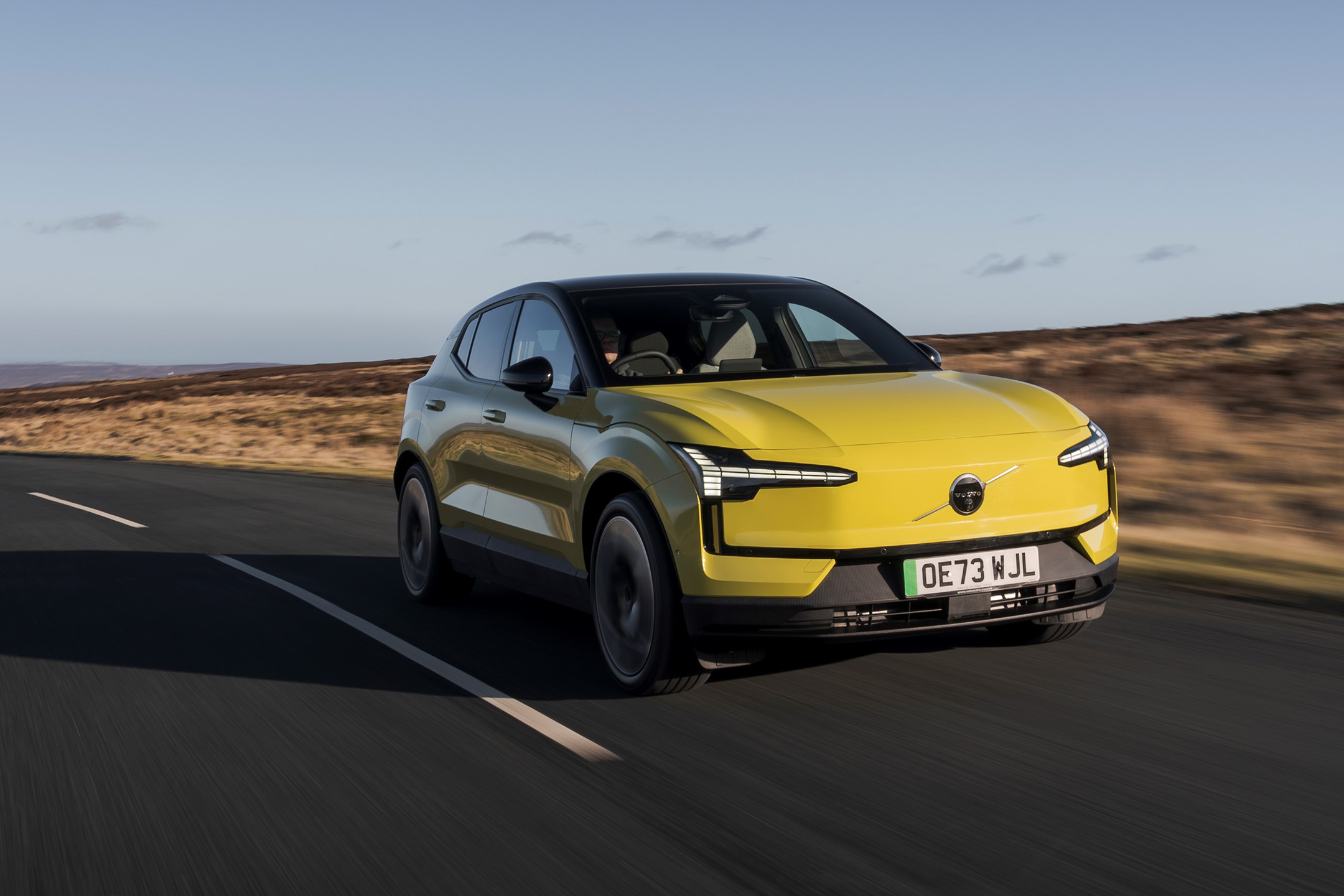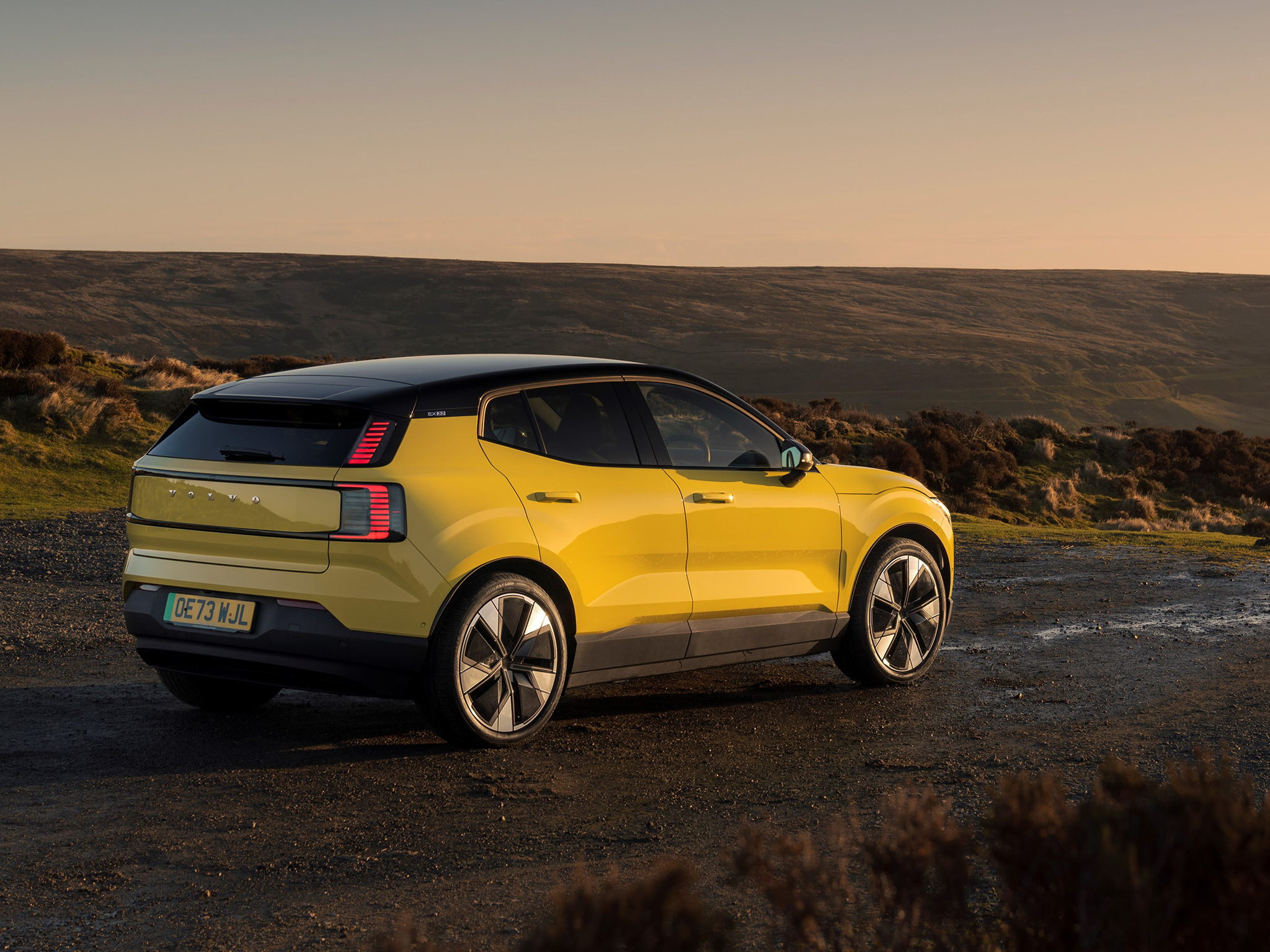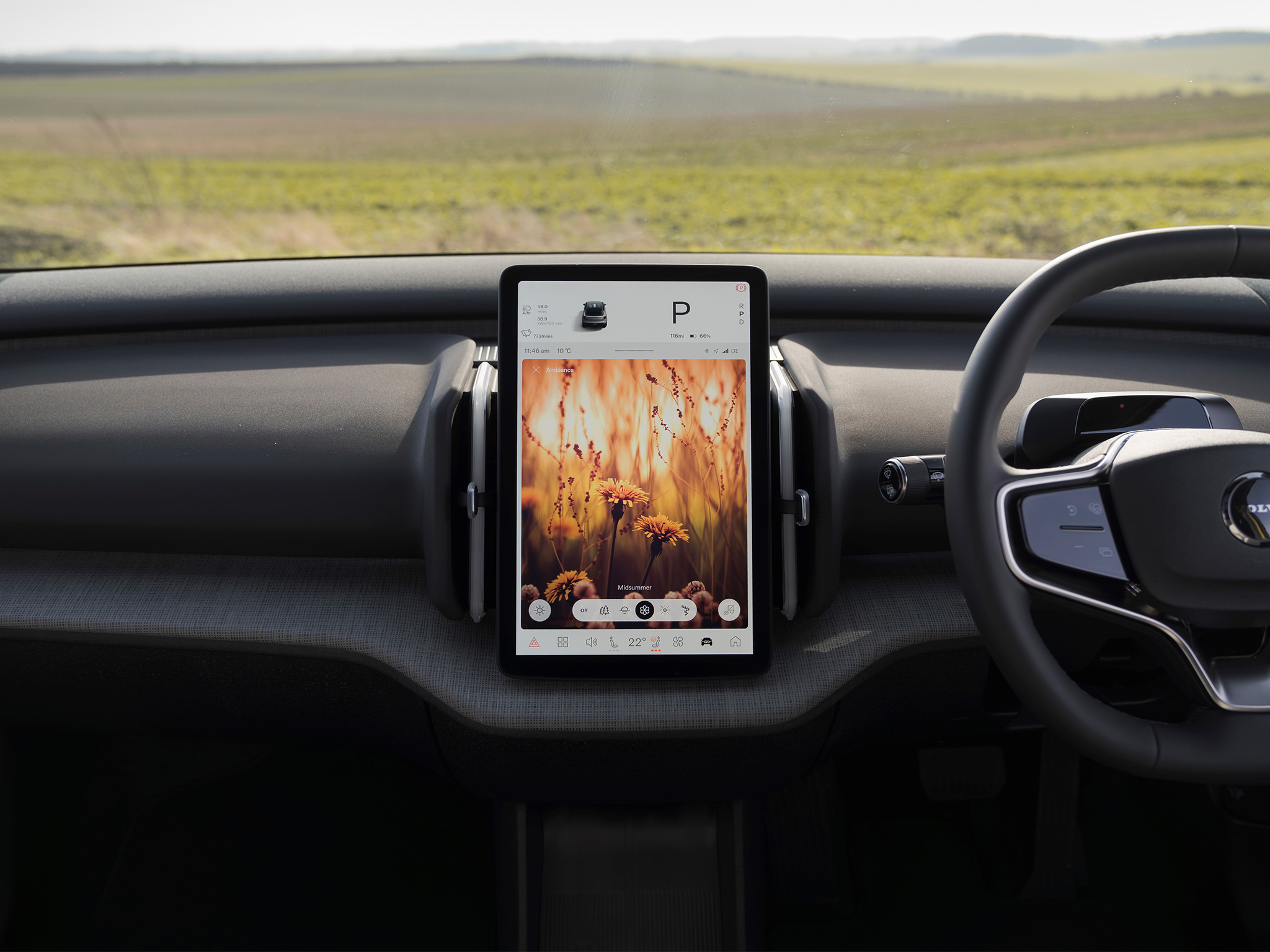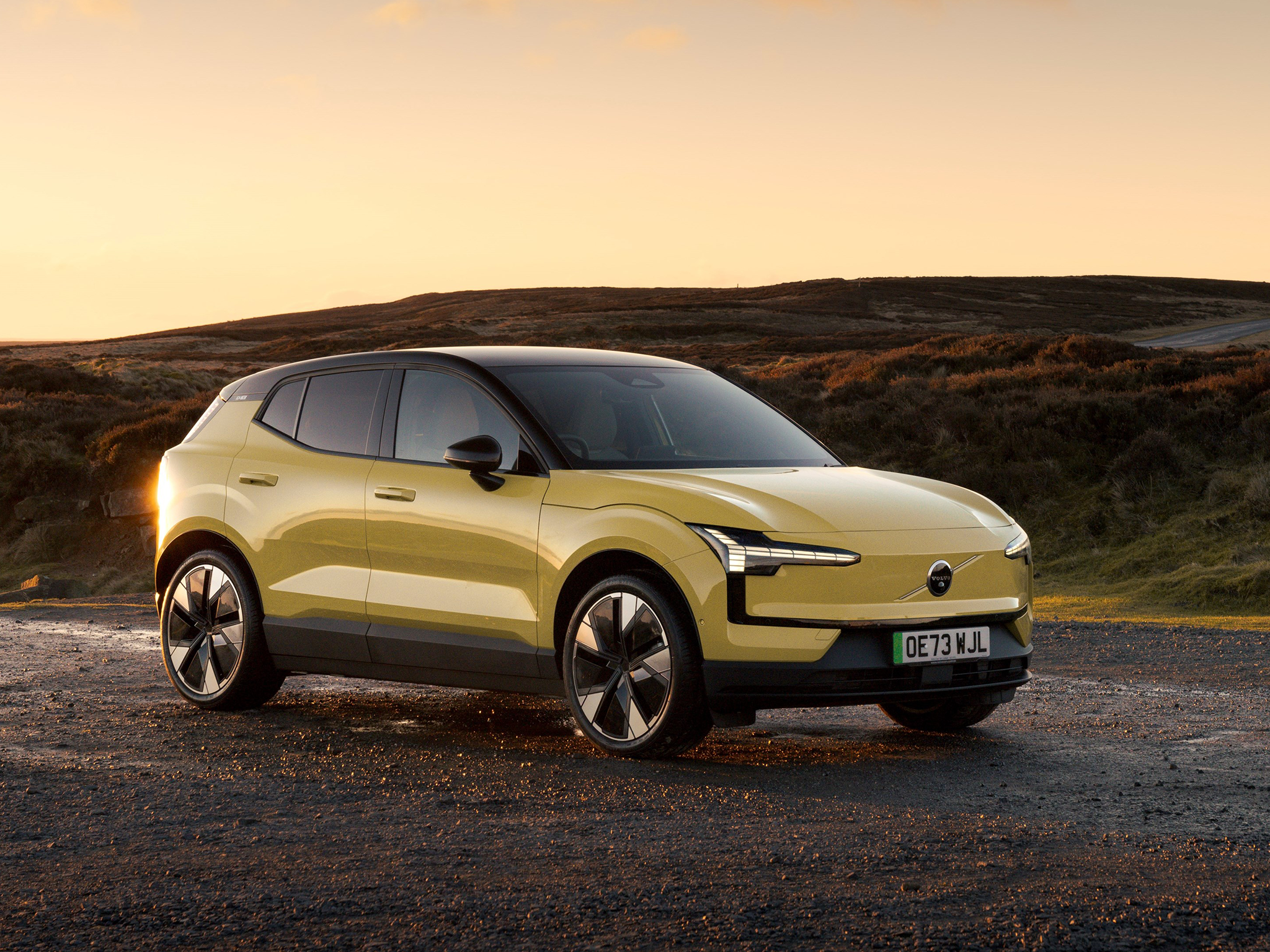Volvo EX30 review: A compact but premium family electric SUV
Volvo’s smallest electric car yet, the EX30 is a compact family EV with a smart, premium aesthetic and a cleverly designed interior, but which can frustrate with its lack of physical controls

The Independent's Electric Vehicles Channel is sponsored by E.ON Next.
Volvo’s smallest car, the EX30 is a (relatively) compact but premium EV that is smartly designed, drives well and, if you spend a bit more money, can offer incredible performance for its category.
The Volvo EX30 can also be purchased with a good amount of premium optional extras, while returning decent efficiency and packing Google’s intuitive Android Automotive system. However, the lack of a dedicated driver display – plus physical controls for key functions like the wipers and mirror adjustment – can be frustrating, and the real-world range of the smaller battery falls short of 200 miles.
Overall, the EX30 is an impressive EV for those who want a smaller and more affordable car, but with a premium badge on its nose and a sense that it’s built to last. Just make sure you approach the touchscreen controls with an open mind and a willingness to retrain some muscle memory.
How we tested
I drove the EX30 in both Spain and the UK, spending over a week with the car in total and using it as my daily driver. I’ve driven it both around London and on extended journeys across the country.
Volvo EX30: From £32,850, Volvocars.com

Independent rating: 7/10
- Pros: Premium design, strong performance, good value
- Cons: Touchscreen frustrations, limited rear space, short range of smaller battery
- Price range: £32,850 to £42,350
- Battery size: 51 kWh or 69 kWh
- Maximum claimed range: 296 miles
- Miles per kWh: 3.68
- Maximum charging rate: 158 kW
- Charging cost per 100 miles on E.ON Next Drive: £1.82
Battery, range, charging, performance and drive
There are three versions of EX30 to pick from. The first has a 51 kWh battery and a single motor powering the rear wheels. It produces 269 bhp and accelerates to 62 mph in 5.7 seconds, while the range is up to 210 miles.
Above this there are two models, both with a larger 69 kWh battery pack and the choice of either a single-motor, rear-drive or dual-motor, all-wheel-drive setup. The former has the same 269 bhp, but a quicker 0-62 mph time of 5.3 seconds and the most range of any EX30, of up to 295 miles. Lastly, the dual-motor EX30 has a somewhat unnecessary 423 horsepower and a 0-62 mph time of 3.6 seconds; its range is up to 280 miles. The single-motor car with the bigger battery is our pick of the bunch.
All three are great to drive, nicely designed and exude a premium feel at a competitive price. The dual-motor car is incredibly quick for an otherwise understated Volvo.
Interior, practicality and boot space
The five-door, five-seat EX30 is the smallest car Volvo sells, yet the interior still manages to feel spacious and airy thanks to its minimal design. There’s lots of clever recycled materials in here and, while priced competitively, the interior still looks and feels of high quality. From the window switches to the door handles, frameless mirrors and clever storage, Volvo has smartly spent a tight budget on all the places that matter most.
That said, cost-saving means there are no physical mirror controls. Instead you have to dig into the touchscreen system, which is also home to the wipers, fog lights and climate controls. It requires some rewriting of your muscle memory and can become frustrating, especially if you need to quickly adjust the mirrors while parking.
Rear space is decent enough for a relatively small car, and while the flat floor aids legroom, you’ll only want to sit two adults back there most of the time, since the middle seat is cramped. The boot capacity isn’t particularly large at 318 litres (plus an extra 61 litres under the false floor) but is about on par for hatchbacks of this size. There’s a small frunk under the bonnet for storing your charge cables.

Technology, stereo and infotainment
There’s no driver display or instrument panel behind the steering wheel. Instead, everything from your speed and gear, to emergency icons, local speed limit, navigation, media and settings are all handled by the central touchscreen. It takes some getting used to, but the Android Automotive system is intuitive enough and navigation with integrated Google Maps works particularly well. Google Assistant also does a decent job of handling your spoken requests, so you can ask it to change the cabin temperature instead of tapping at the screen.
It’s not perfect though, and some elements of the user interface are poorly thought out. For example, a graphic showing the proximity of nearby objects and other traffic sometimes blocks the navigation system, so if a cyclist parks in front of you at the traffic lights your navigation is obscured until the parking sensors stop panicking.
There are no speakers in the doors, but instead a soundbar-style installation below the windscreen works surprisingly well, especially if you go for the optional nine-speaker, 1,040-watt Harman Kardon system.
Prices and running costs
The EX30 starts at £32,850 for the single-motor model with the smaller battery and entry-level Core trim level. This includes a good amount of safety kit, plus adaptive cruise control and all of Google’s services (Maps, Assistant and Play Store). The next trim level is called Plus and increases the price by just £2,300, while adding two-zone climate, a heated steering wheel, extra driver assistance systems and the ability to remotely control the air conditioning when away from the car.
The top trim level, called Ultra, includes the bigger battery and starts at £43,350. It includes a panoramic glass roof, the upgraded stereo, wireless phone charging, a 360-degree camera system, a heat pump, 20-inch wheels, powered front seats and other extras. This essentially turns the EX30 into the sort of premium, feature-packed car you’d expect from Volvo, but it pumps the price up to just over £43,000.

Volve EX30 rivals
FAQs
How long does it take to charge?
The EX30 isn’t the quickest charging EV around, but then its batteries aren’t massive either. You’ll be looking at about 26 to 30 minutes to fill from 10 to 80 percent at a 150 kW public charge station. Plug into a wallbox charger at home and a fill from almost empty to 100 percent will take between seven and eight hours.
How much does it cost - is it worth it?
The EX30’s smart design and clever interior packaging make its £32,850 starting price look like great value. But once you’ve selected the bigger battery and been lured in by all the niceties offered by the Ultra trim option, you’re past £40,000. That said, even at such a price the EX30’s premium looks, potent performance and overall Volvo loveliness make it hard to resist. Volvo’s own lease deals start at £299 a month with a £6,800 deposit.
Does Volvo replace batteries for free?
Like most manufacturers, Volvo covers its EV batteries with a warranty that lasts for eight years or 100,000 miles, whichever comes first. If the battery fails, or its capacity falls by an unreasonable amount in that time, it will be replaced.
The verdict: Volvo EX30
The EX30 blends premium looks with a smart yet compact design. It drives nicely, with plenty of performance on offer, but the touchscreen controls can be frustrating.





Join our commenting forum
Join thought-provoking conversations, follow other Independent readers and see their replies
Comments